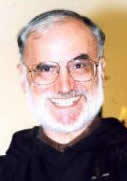The first year of the three year liturgical cycle, year A, begins Sunday. Matthew's Gospel accompanies us through this year.
This Gospel is characterized by its ample reporting of Jesus' teachings -- the famous sermons, such as the Sermon on the Mount -- and its attention to the relationship between the Law and Gospel (the Gospel is the "New Law"). It is also considered the most "ecclesiastical" Gospel because of its account of the primacy of Peter and because of its use of the term "Church," which is not encountered in the other Gospels.
The statement that stands out among all others in this Gospel of the first Sunday of Advent is "Stay awake! For you do not know on which day your Lord will come. […] So too, you also must be prepared, for at an hour you do not expect, the Son of Man will come." We ask ourselves why God would keep hidden something so important as the hour of his coming, which, for each of us, coincides with the hour of death.
The traditional answer is: "So that we will be vigilant, each one of us supposing that it will happen in his days" (St. Ephrem the Syrian). But the principal reason is that God knows us; he knows what terrible anxiety it would be for us to know beforehand the exact hour and to await its slow, inexorable coming. It is that which causes the most fear in regard to certain illnesses.
Today there are more people that die of unforeseen heart problems than those who die of incurable illnesses. But the latter cause more fear because they seem to take away the uncertainty that allows us to hope.
The uncertainty of the hour should not cause us to be careless but to be vigilant. If the liturgical year is at its start, the civil year is at its end. This is an optimal occasion for a sapiential reflection on the meaning of our existence. In autumn, nature itself invites us to reflect on time that passes. That which the poet Giuseppe Ungaretti said of the soldiers in the trenches on the Carso front in the First World War holds for all men: "They are on the trees as leaves in autumn." They are ready to fall at any moment. "Time passes," said our Dante Alighieri, "and man pays no attention."
An ancient philosopher expressed this fundamental experience with a celebrated phrase: "Everything is in flux." Life is like a television screen. The screen is a kind of palimpsest, one program follows and erases the previous one. The screen is the same but the images change. This is how it is with us: The world remains, but we come and go, one after the other. Of all the names, the faces, the news that fills the papers and television today -- of me, of you, of all of us -- what will remain in a few years or a decade? Nothing of nothing. Man is nothing but "a design created by a wave on the sand, which the next wave will wash away."
Let us see what faith has to tell us about this fact that everything passes. "Yet the world and its enticement are passing away. But whoever does the will of God remains forever" (1 John 2:17). There is someone who does not pass, God, and there is also a way for us not to completely disappear: Do God's will, that is, believe and follow God. In this life we are like a raft carried along by the current of a roaring river headed for the open sea, from which there is no return.
At a certain point the raft comes near to the bank. It is now or never and you leap onto the shore. What a relief when you feel the rock under your feet! This is the sensation often felt by those who come to the faith. We might recall at the end of this reflection the words left by Saint Teresa of Avila as a kind of spiritual testament: "Let nothing disturb you, nothing frighten you. All things are passing. God alone remains."
[Translation by Joseph G. Trabbic]

Fr.
Raniero Cantalamessa is a Franciscan
Capuchin Catholic Priest. Born in Ascoli Piceno,
Italy, 22 July 1934, ordained priest in 1958.
Divinity Doctor and Doctor in classical literature.
In 1980 he was appointed by Pope John Paul II
Preacher to the Papal Household in which capacity he
still serves, preaching a weekly sermon in Advent
and Lent.
